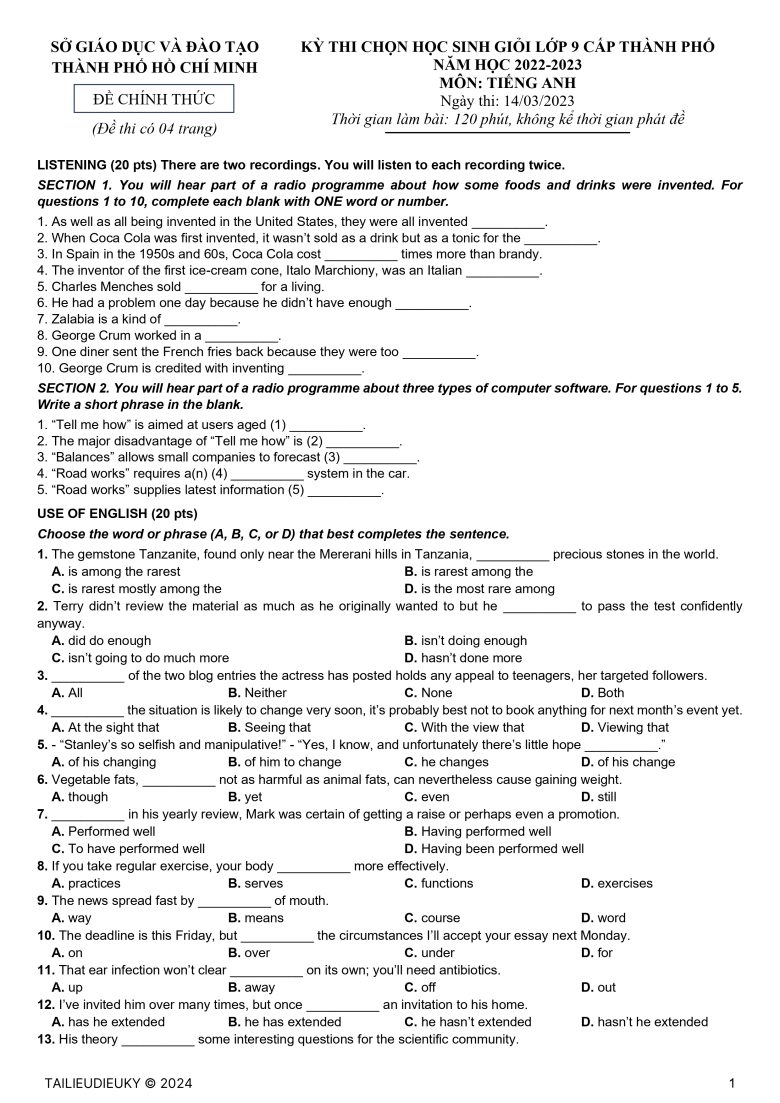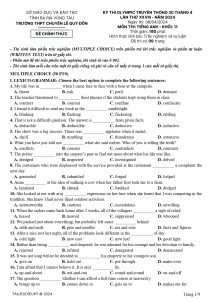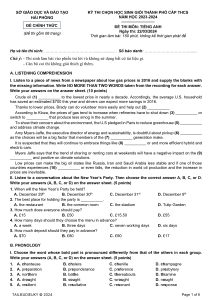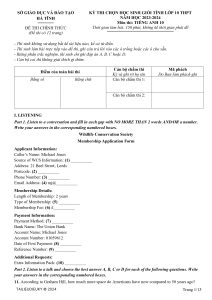Để giúp các thí sinh ôn tập hiệu quả và đạt kết quả cao các trong kỳ thi chọn HSG lớp 9 THCS cấp tỉnh/TP, Tài liệu diệu kỳ đã cập nhật Đề thi HSG lớp 9 TP. Hồ Chí Minh năm học 2022 – 2023 môn Tiếng Anh có đáp án chi tiết ở file đính kèm. Đề thi học sinh giỏi TP Hồ Chí Minh năm nay có cấu trúc tương tự các đề thi năm trước, điểm mới là có 2 bài nghe điền từ, chiếm 20 điểm/tổng điểm toàn bài. Danh sách học sinh đọat giải và kết quả chi tiết sẽ được Sở GD&ĐT TP. HCM công bố chính thức trên cổng thông tin điện tử https://hcm.edu.vn/.
Đề thi chính thức môn Tiếng Anh 9 tại TP. Hồ Chí Minh năm 2023 có 4 trang chia làm 6 phần chính: I. Listening (20 pts); II. Use of English (20 pts); III. Word forms (4 pts); IV. Guided Cloze Test (40 pts); V. Open Cloze Test (40 pts) và VI. Sentence Transformation (30 pts). Tổng điểm toàn bài được quy đổi về thang điểm 20. Quý thầy cô và các em học sinh có thể tải xuống tài liệu file pdf tại website Tài liệu diệu kỳ để chuẩn bị kiến thức thật tốt cho Kỳ thi HSG cấp thành phố năm học 2023-2024 sắp tới.
Năm học 2022-2023, có hơn 3000 học sinh lớp 9 TP. HCM đã tham gia vào kỳ thi chọn học sinh giỏi lớp 9 cấp thành phố năm học 2022-2023, tại 13 môn thi: Ngữ Văn, Lịch sử, Địa lí, Toán học, Vật lí, Hóa học, Sinh học, Tin học, Tiếng Anh, Tiếng Pháp, Tiếng Trung, Tiếng Nhật, Công nghệ.
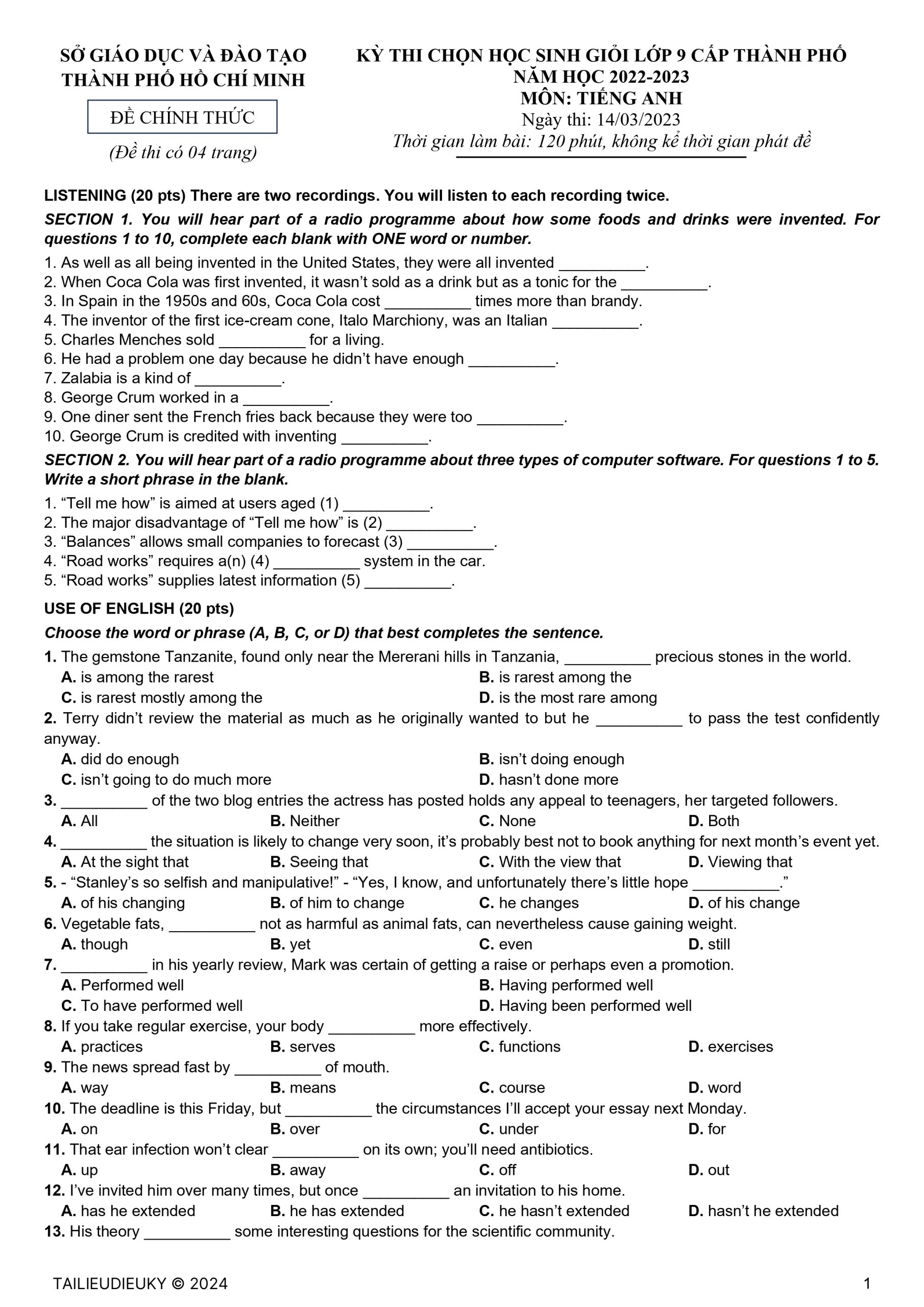
Đề thi HSG lớp 9 TP. Hồ Chí Minh năm học 2022 – 2023 môn Tiếng Anh - Trang 1/4
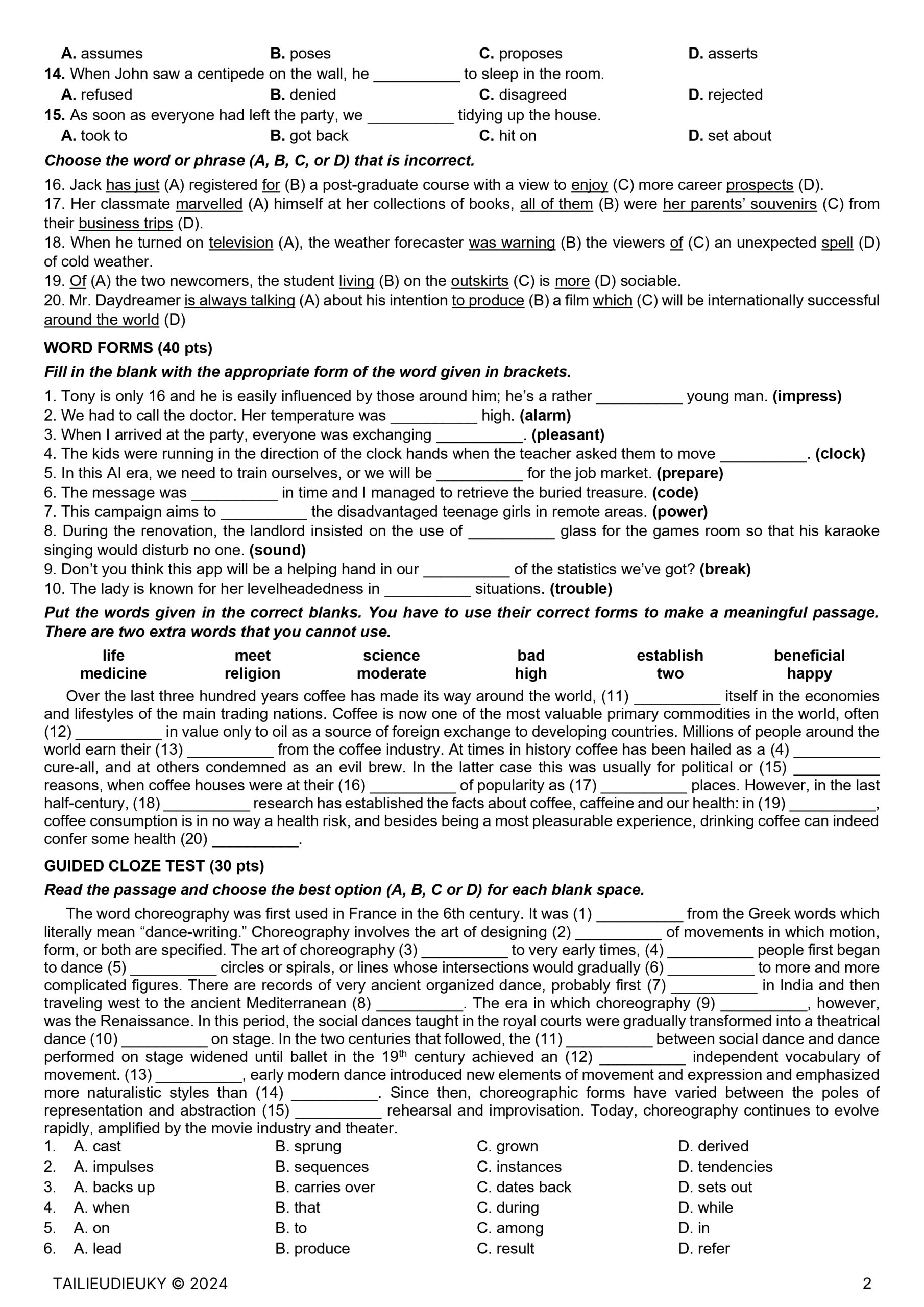
Đề thi HSG lớp 9 TP. Hồ Chí Minh năm học 2022 – 2023 môn Tiếng Anh - Trang 2/4
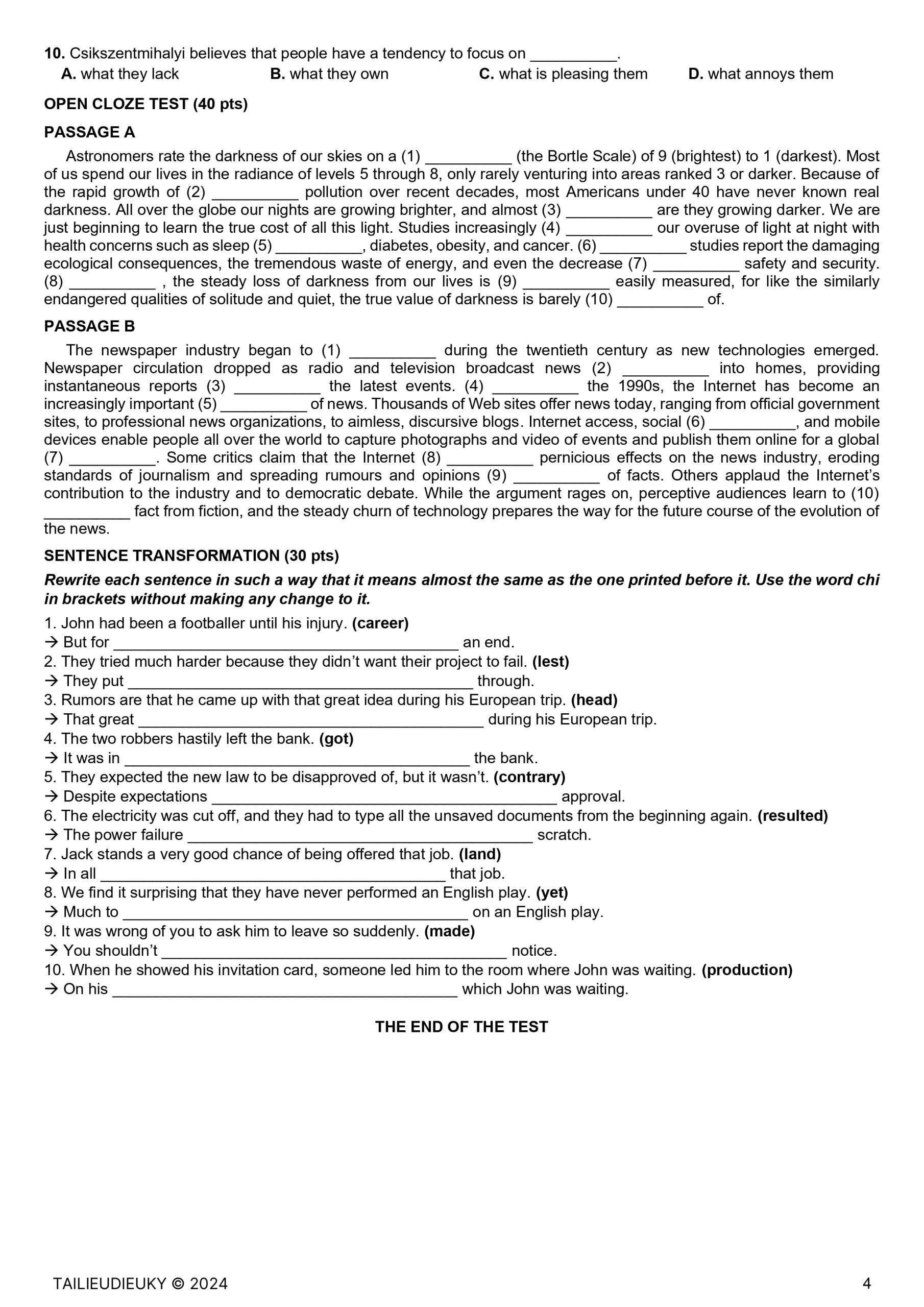
Đề thi HSG lớp 9 TP. Hồ Chí Minh năm học 2022 – 2023 môn Tiếng Anh - Trang 4/4
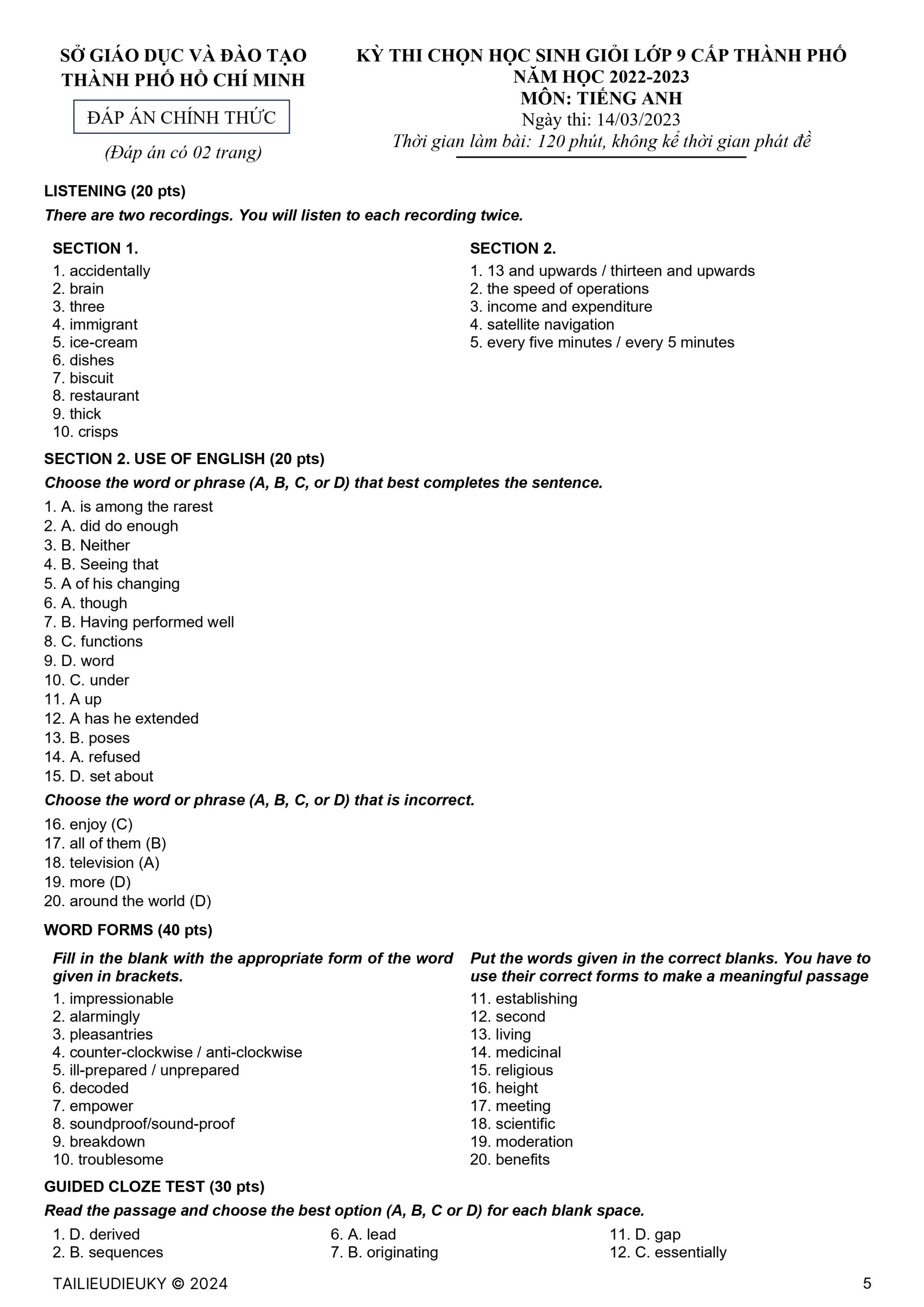
Đáp án chính thức - Đề thi HSG Tiếng Anh 9, TP Hồ Chí Minh - Trang 1/2
SỞ GIÁO DỤC VÀ ĐÀO TẠO
THÀNH PHỐ HỒ CHÍ MINH
(Đáp án có 02 trang)
KỲ THI CHỌN HỌC SINH GIỎI LỚP 9 CẤP THÀNH PHỐ
NĂM HỌC 2022-2023
MÔN: TIẾNG ANH
Ngày thi: 14/03/2023
Thời gian làm bài: 120 phút, không kể thời gian phát đề
LISTENING (20 pts)
There are two recordings. You will listen to each recording twice.
SECTION 1.
1. accidentally
2. brain
3. three
4. immigrant
5. ice-cream
6. dishes
7. biscuit
8. restaurant
9. thick
10. crisps SECTION 2.
1. 13 and upwards / thirteen and upwards
2. the speed of operations
3. income and expenditure
4. satellite navigation
5. every five minutes / every 5 minutes
SECTION 2. USE OF ENGLISH (20 pts)
Choose the word or phrase (A, B, C, or D) that best completes the sentence.
1. A. is among the rarest
2. A. did do enough
3. B. Neither
4. B. Seeing that
5. A of his changing
6. A. though
7. B. Having performed well
8. C. functions
9. D. word
10. C. under
11. A up
12. A has he extended
13. B. poses
14. A. refused
15. D. set about
Choose the word or phrase (A, B, C, or D) that is incorrect.
16. enjoy (C)
17. all of them (B)
18. television (A)
19. more (D)
20. around the world (D)
WORD FORMS (40 pts)
Fill in the blank with the appropriate form of the word given in brackets. Put the words given in the correct blanks. You have to use their correct forms to make a meaningful passage
1. impressionable
2. alarmingly
3. pleasantries
4. counter-clockwise / anti-clockwise
5. ill-prepared / unprepared
6. decoded
7. empower
8. soundproof/sound-proof
9. breakdown
10. troublesome 11. establishing
12. second
13. living
14. medicinal
15. religious
16. height
17. meeting
18. scientific
19. moderation
20. benefits
GUIDED CLOZE TEST (30 pts)
Read the passage and choose the best option (A, B, C or D) for each blank space.
1. D. derived
2. B. sequences
3. C. dates back
4. A. when
5. D. in 6. A. lead
7. B. originating
8. C. regions
9. B. blossomed
10. D. performed 11. D. gap
12. C. essentially
13. A. Subsequently
14. B. had classical ballet
15. D. as well as
READING COMPREHENSION (20 pts)
Choose the item (A, B, C or D) that best completes the unfinished statement about the passage.
1. B. is not influenced by wealth.
2. A. recreational activity
3. B. do a bungee jump
4. C. happiness implies never having problems
5. D. invariably
6. B. being able to handle problems
7. C. ‘the flow’
8. D. activities done for personal pleasure
9. C. we experience more anxiety
10. A. what they lack
OPEN CLOZE TEST (40 pts)
Fill in each blank with ONE suitable word to make a meaningful passage.
PASSAGE A
1. scale
2. light
3. nowhere
4. link/association
5. disorders
6. Other
7. in
8. However / Nevertheless / Nonetheless
9. not
10. aware / conscious PASSAGE B
1. decline
2. directly
3. on
4. Since
5. source
6. media
7. audience
8. has
9. instead
10. tell / distinguish
SENTENCE TRANSFORMATION (30 pts)
Rewrite each sentence in such a way that it means almost the same as the one printed before it. Use the word in brackets without making any change to it.
- Học sinh viết câu chưa hoàn chỉnh hoặc không có từ đã cho: 0đ
- Học sinh viết đúng 1 vế: 1đ
- Học sinh viết đúng hết các ý, nhưng phạm 1 lỗi chính tả: 2đ
1. But for his injury, his career as a footballer // wouldn’t have come to an end.
2. They put in more efforts // lest their project (should) fall through.
They put more efforts into their project // lest it (should) fall through.
3. That great idea is rumored to have entered his head during his European trip.
4. It was in haste that // the two robbers got away from the bank.
5. Despite expectations to the contrary, // the new law met with everyone’s approval.
6. The power failure resulted in their typing all the documents again // from scratch.
7. In all likelihood / probability, // Jack will land that job.
8. Much to our surprise, // they have yet to put on an English play.
9. You shouldn’t have made him leave // at short notice.
10. On his production of his invitation card, // he was shown / led to the room in which John was waiting.
THE END OF THE TEST
Trích dẫn Đề thi HSG Tiếng Anh 9, TP Hồ Chí Minh, năm học 2022-2023
SỞ GIÁO DỤC VÀ ĐÀO TẠO
THÀNH PHỐ HỒ CHÍ MINH
(Đề thi có 04 trang)
KỲ THI CHỌN HỌC SINH GIỎI LỚP 9 CẤP THÀNH PHỐ
NĂM HỌC 2022-2023
MÔN: TIẾNG ANH
Ngày thi: 14/03/2023
Thời gian làm bài: 120 phút, không kể thời gian phát đề
LISTENING (20 pts) There are two recordings. You will listen to each recording twice.
SECTION 1. You will hear part of a radio programme about how some foods and drinks were invented. For questions 1 to 10, complete each blank with ONE word or number.
1. As well as all being invented in the United States, they were all invented __________.
2. When Coca Cola was first invented, it wasn’t sold as a drink but as a tonic for the __________.
3. In Spain in the 1950s and 60s, Coca Cola cost __________ times more than brandy.
4. The inventor of the first ice-cream cone, Italo Marchiony, was an Italian __________.
5. Charles Menches sold __________ for a living.
6. He had a problem one day because he didn’t have enough __________.
7. Zalabia is a kind of __________.
8. George Crum worked in a __________.
9. One diner sent the French fries back because they were too __________.
10. George Crum is credited with inventing __________.
SECTION 2. You will hear part of a radio programme about three types of computer software. For questions 1 to 5. Write a short phrase in the blank.
1. “Tell me how” is aimed at users aged (1) __________.
2. The major disadvantage of “Tell me how” is (2) __________.
3. “Balances” allows small companies to forecast (3) __________.
4. “Road works” requires a(n) (4) __________ system in the car.
5. “Road works” supplies latest information (5) __________.
USE OF ENGLISH (20 pts)
Choose the word or phrase (A, B, C, or D) that best completes the sentence.
1. The gemstone Tanzanite, found only near the Mererani hills in Tanzania, __________ precious stones in the world.
A. is among the rarest B. is rarest among the
C. is rarest mostly among the D. is the most rare among
2. Terry didn’t review the material as much as he originally wanted to but he __________ to pass the test confidently anyway.
A. did do enough B. isn’t doing enough
C. isn’t going to do much more D. hasn’t done more
3. __________ of the two blog entries the actress has posted holds any appeal to teenagers, her targeted followers.
A. All B. Neither C. None D. Both
4. __________ the situation is likely to change very soon, it’s probably best not to book anything for next month’s event yet.
A. At the sight that B. Seeing that C. With the view that D. Viewing that
5. - “Stanley’s so selfish and manipulative!” - “Yes, I know, and unfortunately there’s little hope __________.”
A. of his changing B. of him to change C. he changes D. of his change
6. Vegetable fats, __________ not as harmful as animal fats, can nevertheless cause gaining weight.
A. though B. yet C. even D. still
7. __________ in his yearly review, Mark was certain of getting a raise or perhaps even a promotion.
A. Performed well B. Having performed well
C. To have performed well D. Having been performed well
8. If you take regular exercise, your body __________ more effectively.
A. practices B. serves C. functions D. exercises
9. The news spread fast by __________ of mouth.
A. way B. means C. course D. word
10. The deadline is this Friday, but __________ the circumstances I’ll accept your essay next Monday.
A. on B. over C. under D. for
11. That ear infection won’t clear __________ on its own; you’ll need antibiotics.
A. up B. away C. off D. out
12. I’ve invited him over many times, but once __________ an invitation to his home.
A. has he extended B. he has extended C. he hasn’t extended D. hasn’t he extended
13. His theory __________ some interesting questions for the scientific community.
A. assumes B. poses C. proposes D. asserts
14. When John saw a centipede on the wall, he __________ to sleep in the room.
A. refused B. denied C. disagreed D. rejected
15. As soon as everyone had left the party, we __________ tidying up the house.
A. took to B. got back C. hit on D. set about
Choose the word or phrase (A, B, C, or D) that is incorrect.
16. Jack has just (A) registered for (B) a post-graduate course with a view to enjoy (C) more career prospects (D).
17. Her classmate marvelled (A) himself at her collections of books, all of them (B) were her parents’ souvenirs (C) from their business trips (D).
18. When he turned on television (A), the weather forecaster was warning (B) the viewers of (C) an unexpected spell (D) of cold weather.
19. Of (A) the two newcomers, the student living (B) on the outskirts (C) is more (D) sociable.
20. Mr. Daydreamer is always talking (A) about his intention to produce (B) a film which (C) will be internationally successful around the world (D)
WORD FORMS (40 pts)
Fill in the blank with the appropriate form of the word given in brackets.
1. Tony is only 16 and he is easily influenced by those around him; he’s a rather __________ young man. (impress)
2. We had to call the doctor. Her temperature was __________ high. (alarm)
3. When I arrived at the party, everyone was exchanging __________. (pleasant)
4. The kids were running in the direction of the clock hands when the teacher asked them to move __________. (clock)
5. In this AI era, we need to train ourselves, or we will be __________ for the job market. (prepare)
6. The message was __________ in time and I managed to retrieve the buried treasure. (code)
7. This campaign aims to __________ the disadvantaged teenage girls in remote areas. (power)
8. During the renovation, the landlord insisted on the use of __________ glass for the games room so that his karaoke singing would disturb no one. (sound)
9. Don’t you think this app will be a helping hand in our __________ of the statistics we’ve got? (break)
10. The lady is known for her levelheadedness in __________ situations. (trouble)
Put the words given in the correct blanks. You have to use their correct forms to make a meaningful passage. There are two extra words that you cannot use.
life meet science bad establish beneficial
medicine religion moderate high two happy
Over the last three hundred years coffee has made its way around the world, (11) __________ itself in the economies and lifestyles of the main trading nations. Coffee is now one of the most valuable primary commodities in the world, often (12) __________ in value only to oil as a source of foreign exchange to developing countries. Millions of people around the world earn their (13) __________ from the coffee industry. At times in history coffee has been hailed as a (4) __________ cure-all, and at others condemned as an evil brew. In the latter case this was usually for political or (15) __________ reasons, when coffee houses were at their (16) __________ of popularity as (17) __________ places. However, in the last half-century, (18) __________ research has established the facts about coffee, caffeine and our health: in (19) __________, coffee consumption is in no way a health risk, and besides being a most pleasurable experience, drinking coffee can indeed confer some health (20) __________.
GUIDED CLOZE TEST (30 pts)
Read the passage and choose the best option (A, B, C or D) for each blank space.
The word choreography was first used in France in the 6th century. It was (1) __________ from the Greek words which literally mean “dance-writing.” Choreography involves the art of designing (2) __________ of movements in which motion, form, or both are specified. The art of choreography (3) __________ to very early times, (4) __________ people first began to dance (5) __________ circles or spirals, or lines whose intersections would gradually (6) __________ to more and more complicated figures. There are records of very ancient organized dance, probably first (7) __________ in India and then traveling west to the ancient Mediterranean (8) __________. The era in which choreography (9) __________, however, was the Renaissance. In this period, the social dances taught in the royal courts were gradually transformed into a theatrical dance (10) __________ on stage. In the two centuries that followed, the (11) __________ between social dance and dance performed on stage widened until ballet in the 19th century achieved an (12) __________ independent vocabulary of movement. (13) __________, early modern dance introduced new elements of movement and expression and emphasized more naturalistic styles than (14) __________. Since then, choreographic forms have varied between the poles of representation and abstraction (15) __________ rehearsal and improvisation. Today, choreography continues to evolve rapidly, amplified by the movie industry and theater.
1. A. cast B. sprung C. grown D. derived
2. A. impulses B. sequences C. instances D. tendencies
3. A. backs up B. carries over C. dates back D. sets out
4. A. when B. that C. during D. while
5. A. on B. to C. among D. in
6. A. lead B. produce C. result D. refer
7. A. proceeding B. originating C. reconnecting D. arriving
8. A. areas B. territories C. regions D. premises
9. A. succeeded B. blossomed C. pollinated D. achieved
10. A. conducted B. designed C. intended D. performed
11. A. void B. dissimilarity C. difference D. gap
12. A. officially B. unanimously C. essentially D. idly
13. A. Subsequently B. Accordingly C. Considerably D. Particularly
14. A. classical ballet did B. had classical ballet C. was classical ballet D. classical ballet might
15. A. as long as B. as widely as C. as far as D. as well as
Choose the item (A, B, C or D) that best completes the unfinished statement about the passage.
“Happiness is not having what you want but wanting what you have,” according to James Stewart. Although scientists now understand the roots of depression more clearly than they used to, happiness still remains a mystery. Recently, however, some interesting discoveries have been made.
Those who say they are happy, for example, tend to be less self-centred, less hostile and abusive, and are less prone to disease and general ill health. Interestingly, the affluent are not notably happier than their less-well-off counterparts, and seemingly, no particular time of life is significantly happier than any other. Even though some people see life as a tragedy, when questioned, most people said they were generally happy - painting a much rosier picture regarding people’s general moods and dispositions.
Research has shown that people have two basic reward centres in their brains that are stimulated by two different chemicals which cause happiness. The first, dopamine, is triggered by activities like exercise, relaxation and the quieter pleasures. The second comprises a set of adrenaline-type chemicals which are triggered by exciting or frightening activities. Dopamine provokes a response of passive happiness, while the second set of chemicals provokes a high-energy state of happiness, the feeling one might get from public speaking or mountain climbing.
While understanding the chemical process behind happiness is important, it does not explain why only some people are consistently happy. The answer may lie in people’s perceptions of happiness.
One of the reasons we have such a problem with happiness is that many confuse it with a life untouched by anxiety, rage, doubt and sadness. The belief that happiness means that nothing ever goes wrong is naive; in order to be happy, we must know not how to avoid disturbing events, but how to deal with them.
The key to coping with life’s unpleasant aspects, while remaining content, comes from an everyday practice which Mihaly Csikszentmihalyi calls “the flow”. He describes “the flow” as the state one is in when doing something completely absorbing. It comes when one is pushed right up to the limit of one’s ability, but not beyond it. “People can get a feeling of flow from dangerous sports like mountain climbing or driving fast,” he says “but it can also come; from something relaxing like painting or reading a good book.” The point is that it’s an activity you do for the pleasure of doing it. You are not looking for praise or reward. What is important is to keep your brain busy if you want to be happy. The professor explains, “If you leave someone on their own with nothing specific to do, most of their thoughts will be worries.” People tend to think about all the things they want and haven’t got rather than how good their life is. It seems the key to happiness lies in having an active and challenging lifestyle.
The scientific study of happiness will help us understand how to build a world that improves human well-being and self esteem, and how to get the most satisfaction from their goals and circumstances.
1. Studies have shown that happiness __________.
A. is positively influenced by wealth B. is not influenced by wealth
C. is negatively influenced by wealth D. does not influence wealth
2. Dopamine is produced by __________.
A. recreational activity B. fright C. high-energy activity D. pleasure
3. Dopamine is NOT released when we __________.
A. watch a documentary B. do a bungee jump C. hear a joke D. work out
4. A common misconception about happiness is that __________.
A. rich people are happier B. happy people perceive things differently
C. happiness implies never having problems D. happiness stems from being naive
5. The word “consistently” in paragraph 4 means __________.
A. surprisingly B. extremely C. mysteriously D. invariably
6. In reality, consistent happiness lies in __________.
A. no feeling anxious B. being able to handle problems
C. not having problems D. not confusing our feelings
7. The underlined word “it” in paragraph 6 refers to __________.
A. people B. a dangerous sport C. “the flow” D. research
8. According to Csikszentmihalyi, ‘the flow’ is triggered by __________.
A. external reward B. doing nothing for a duration of time
C. challenging others D. activities done for personal pleasure
9. When we are inactive __________.
A. we don’t get what we want B. we try to challenge ourselves
C. we experience more anxiety D. we think everything is fine
10. Csikszentmihalyi believes that people have a tendency to focus on __________.
A. what they lack B. what they own C. what is pleasing them D. what annoys them
OPEN CLOZE TEST (40 pts)
PASSAGE A
Astronomers rate the darkness of our skies on a (1) __________ (the Bortle Scale) of 9 (brightest) to 1 (darkest). Most of us spend our lives in the radiance of levels 5 through 8, only rarely venturing into areas ranked 3 or darker. Because of the rapid growth of (2) __________ pollution over recent decades, most Americans under 40 have never known real darkness. All over the globe our nights are growing brighter, and almost (3) __________ are they growing darker. We are just beginning to learn the true cost of all this light. Studies increasingly (4) __________ our overuse of light at night with health concerns such as sleep (5) __________, diabetes, obesity, and cancer. (6) __________ studies report the damaging ecological consequences, the tremendous waste of energy, and even the decrease (7) __________ safety and security. (8) __________ , the steady loss of darkness from our lives is (9) __________ easily measured, for like the similarly endangered qualities of solitude and quiet, the true value of darkness is barely (10) __________ of.
PASSAGE B
The newspaper industry began to (1) __________ during the twentieth century as new technologies emerged. Newspaper circulation dropped as radio and television broadcast news (2) __________ into homes, providing instantaneous reports (3) __________ the latest events. (4) __________ the 1990s, the Internet has become an increasingly important (5) __________ of news. Thousands of Web sites offer news today, ranging from official government sites, to professional news organizations, to aimless, discursive blogs. Internet access, social (6) __________, and mobile devices enable people all over the world to capture photographs and video of events and publish them online for a global (7) __________. Some critics claim that the Internet (8) __________ pernicious effects on the news industry, eroding standards of journalism and spreading rumours and opinions (9) __________ of facts. Others applaud the Internet’s contribution to the industry and to democratic debate. While the argument rages on, perceptive audiences learn to (10) __________ fact from fiction, and the steady churn of technology prepares the way for the future course of the evolution of the news.
SENTENCE TRANSFORMATION (30 pts)
Rewrite each sentence in such a way that it means almost the same as the one printed before it. Use the word chi in brackets without making any change to it.
1. John had been a footballer until his injury. (career)
=> But for ________________________________________ an end.
2. They tried much harder because they didn’t want their project to fail. (lest)
=> They put ________________________________________ through.
3. Rumors are that he came up with that great idea during his European trip. (head)
=> That great ________________________________________ during his European trip.
4. The two robbers hastily left the bank. (got)
=> It was in ________________________________________ the bank.
5. They expected the new law to be disapproved of, but it wasn’t. (contrary)
=> Despite expectations ________________________________________ approval.
6. The electricity was cut off, and they had to type all the unsaved documents from the beginning again. (resulted)
=> The power failure ________________________________________ scratch.
7. Jack stands a very good chance of being offered that job. (land)
=> In all ________________________________________ that job.
8. We find it surprising that they have never performed an English play. (yet)
=> Much to ________________________________________ on an English play.
9. It was wrong of you to ask him to leave so suddenly. (made)
=> You shouldn’t ________________________________________ notice.
10. When he showed his invitation card, someone led him to the room where John was waiting. (production)
=> On his ________________________________________ which John was waiting.
THE END OF THE TEST
